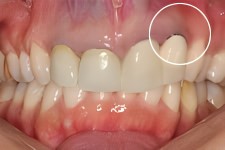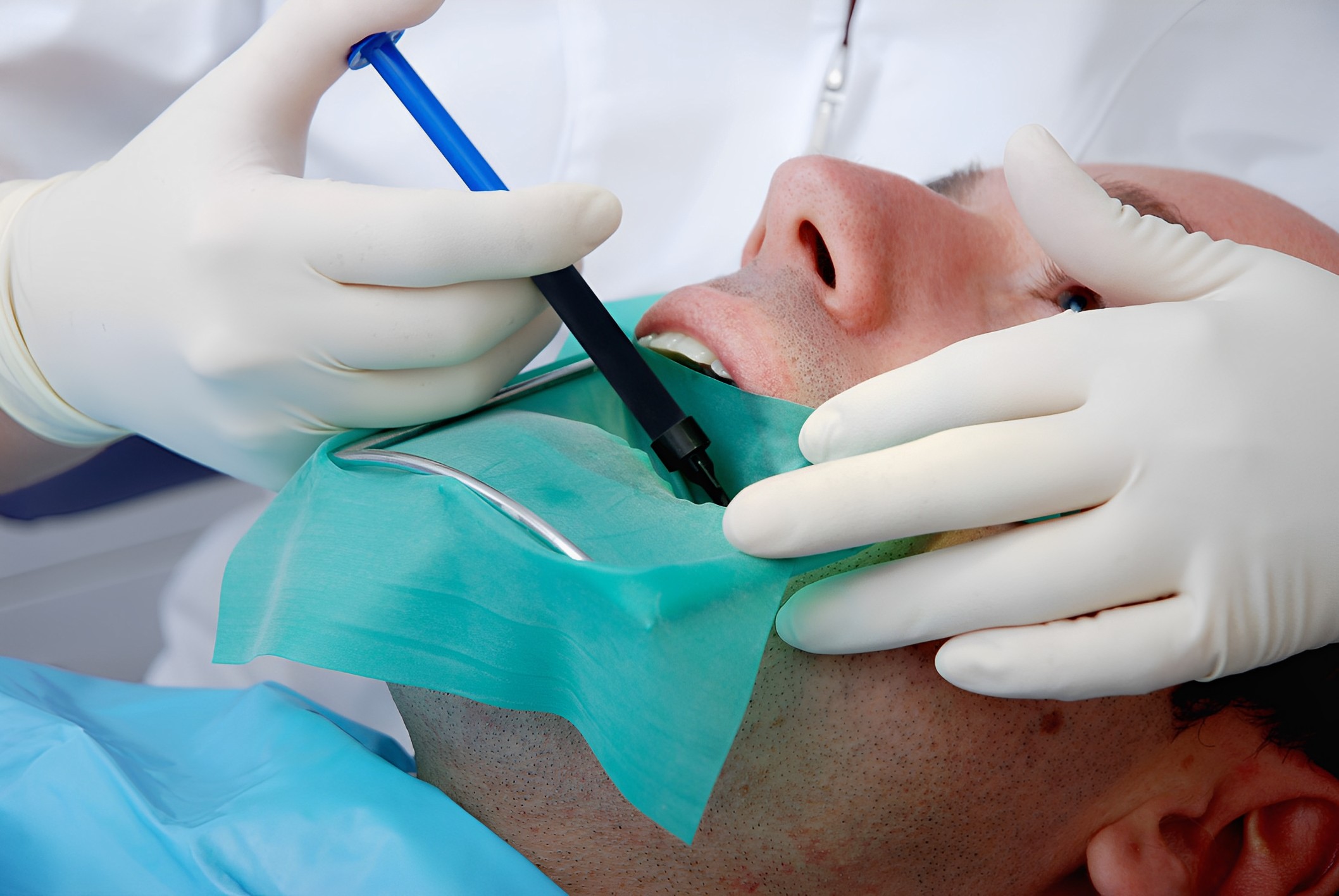If you’ve been told you need a root canal, it’s natural to have concerns about the procedure. By learning more about how this treatment works, you can feel confident in your decision to protect your oral health.
At Hampton Dental Associates, Dr. Richard Winter and his skilled team provide high-quality dental care to patients in Milwaukee, Wisconsin. Dr. Winter will give you his utmost attention in order to make sure you get the best reconstructive dental treatment possible.
What Is a Root Canal?
Despite common misconceptions, root canals exist to save your tooth – not cause more discomfort! Unfortunately, this myth is why many people put off getting a root canal until their dental condition has worsened.

A root canal procedure helps repair a tooth (and saves it from extraction) when it becomes infected due to deep decay, repeated dental treatments, cracks or chips, large tooth fillings, or trauma. Dr. Winter removes the infected nerve and tooth pulp, then seals off the tooth to prevent any further damage.
How Do I Know If My Tooth Pulp Is Infected?
It can be hard to tell early on that you have an infected tooth pulp unless you go to the dentist for regular check-ups. Many people mistake an infected tooth pulp for a toothache that will not go away and seek help from their dentist when the condition has already worsened.
Telltale signs that your tooth is infected and may need a root canal are:
- A chronic toothache that gets worse when you chew or apply pressure to the affected tooth
- Sudden sensitivity to hot and cold temperatures
- Discoloration on the affected tooth
- Swelling or tender gums near the infected tooth
- Pimples on the gums
If you experience any of these, make sure to schedule a visit with our team in Milwaukee to discuss if you will need a root canal procedure.
What Happens If I Don’t Get a Root Canal?
If you delay or avoid getting a root canal, the infection inside your tooth will continue to spread. Over time, the tissue surrounding the tooth can form an abscess, which is a painful pocket of pus caused by the infection. Once an abscess forms, it becomes much harder to save the tooth, and extraction may be the only option.
An abscess can cause severe symptoms, including swelling in the face, jaw, or neck, and may lead to bone loss around the tooth root. The infection can also create drainage issues, resulting in small holes forming through the gums or cheek, allowing pus to drain out.
In addition to these painful effects, an untreated abscess can spread the infection to other areas of the body, increasing the risk of more serious complications.
It’s critical to your health to address the problem early with a root canal, which can save your tooth and prevent further damage.
What Are the Benefits of Having a Root Canal?
At Hampton Dental Associates, we think of root canals as life preservers for your teeth. Here are the main benefits of having a root canal:
- Prevents Tooth Loss: A root canal allows you to save your natural tooth rather than resorting to extraction, which would require more extensive procedures like a dental implant or bridge to replace it.
- Stops Infection From Spreading: Root canals are necessary when decay or bacteria penetrate deep into the tooth, reaching the pulp. If left untreated, the infection can worsen, potentially leading to an abscess and spreading throughout the body.
- Relieves Pain: Although root canals have a bad reputation, they actually relieve the pain of an infected tooth.
- Preserves Your Smile and Bite: After a root canal, your tooth can function and look just like the rest of your teeth. The idea that teeth will fall out without their inner nerves and blood vessels is a myth; once they’re fully developed, teeth no longer rely on their blood supply to stay in place.
- Long-Lasting Solution: A tooth that’s had a root canal can last for the rest of your life if you take proper care of it.
What Is the Root Canal Procedure?
At Hampton Dental Associates, 98% or more of all root canals are completed in one visit, with a follow-up visit to prepare and place the crown. Expect the following during your root canal:
- Initial Testing: Dr. Winter will start with a dental X-ray to evaluate the infection and develop a treatment plan that best suits your needs.
- Local Anesthesia: He will numb the affected area using local anesthesia to make sure you're comfortable throughout the procedure.
- Isolation with a Rubber Dam: We’ll place a rubber dam around your tooth to keep the area dry by draining saliva.
- Accessing the Tooth: Dr. Winter will carefully drill a small hole into your tooth to get to the infected pulp and root canals.

- Cleaning the Tooth: Using specialized dental files, he will clean out the entire cavity, removing the infected pulp, decayed nerve tissues, and any debris until there is no infection left.
- Flushing the Tooth: He will flush the cavity with water or sodium hypochlorite to remove any remaining debris and bacteria.
- Sealing the Tooth: Once the tooth is clean, Dr. Winter will fill the interior of the tooth with gutta-percha, a rubber-like material that seals the space and prevents further infection. Most of the time a filling or core is placed in the tooth which will seal the gutta percha and allow you to lightly chew on the tooth until a crown appointment can be scheduled.
- Crown Preparation: At your next visit, Dr. Winter will prepare the tooth for a crown to protect it and ensure it’s strong enough to prevent fractures.
How Long Does a Root Canal Procedure Take?
The average root canal with the team at Hampton Dental takes between 30 minutes and an hour. More complex situations could take up to 90 minutes.
Usually, because we place a porcelain crown on the tooth receiving the root canal, the process takes two appointments: one to perform the root canal and post and core/filling a second to prepare the tooth for a crown and a third visit to place the custom crown.

If the root canal is for a smaller tooth, such as an incisor, we may be able to skip the crown and just place a filling instead. This would make the entire process only a single appointment.
What Is Recovery Like After a Root Canal?
Recovery from a root canal is typically smooth and manageable. Here's what you can expect:
- Soreness: Mild discomfort for two to three days is normal. Over-the-counter pain relievers like ibuprofen can help.
- Eating Soft Foods: Stick to soft foods while your tooth heals, and avoid anything hard, crunchy, or sticky.
- Follow-Up for a Crown: If you need a crown, you’ll return for a follow-up appointment to protect the tooth long-term.
- Rest and Recovery: Take it easy the day of your procedure, but most patients can resume normal activities the next day.
- Post-Procedure Care: Continue with your regular oral hygiene routine, being gentle around the treated area. Contact Dr. Winter if you notice any unusual pain or swelling.
Why Choose Hampton Dental Associates for Your Root Canal
Dr. Richard Winter is certified by the American Board of Oral Implantologists/Implant Dentistry (ABOI/ID) and has a Mastership in the Academy of General Dentistry. These are just two of many accomplishments that show that he is a dentist who prioritizes patient comfort, satisfaction, and optimal oral health.
Dr. Winter and his team of experienced dental professionals understand the importance of helping patients achieve healthy teeth and the smile they’ve always wanted. Choosing Hampton Dental Associates for your root canal will allow you to undergo a dental procedure and recovery with a trustworthy team who is willing and ready to improve your oral health for the better.
Hear What Our Patients Have to Say!
“Had bad experiences in the past….. I was extremely nervous & the assistant and doctor made my visit wonderful!! No pain!! He explained the process along the way. Very comforting!!! I’ll be back for follow up!!!” – Patrice B.
“I had a complex surgery and I was very scared but they made me feel so comfortable and it was so quick and the office staff is the best on the world my job required a lot of paper work and I was help through it every step of the way Thank you for everything Hampton Dental.” – Sandy R.
“Hampton Dental has provided the best experience I’ve ever had at the dentist office! They are personable and professional. Even if you are having a procedure done, the staff strive to make sure that it is an enjoyable experience (I’ve had a few). I highly recommend this office, they are amazing!” – Jason
What Will the Results of My Root Canal Look Like?
Once we clean out the infected tooth, fill the interior with gutta-percha, and place a filling and/or crown on the tooth, no one will be able to tell any difference between this tooth and any others in your mouth. If we place a crown on the tooth, it will match the color of your adjacent teeth. If we only need to place a filling, we use composite resin, which makes for a basically invisible filling.
What Foods Can I Eat After a Root Canal Procedure?
There are certainly some restrictions after your root canal. No gum chewing, caramel, taffy, raw carrots, or beef jerky!
You may have some mild soreness from having your mouth open during the procedure, but your usual diet will be fine if you don't overwork this tooth. Once a crown is placed, we will still caution you to avoid really sticky foods to preserve the crown, but it will be much more protected.
Risks of Root Canal
As with any dental treatment, a root canal can have some complications, even if your dentist has done a great job clearing the infected tooth of the infection.
It is possible that the bacteria from the infected tooth can get carried onto the surrounding areas of the teeth through your gum’s blood supply system.

If you feel any unusual pain after the root canal procedure, be sure to go back to your dentist. Often, this type of condition can be managed with antibiotics and painkillers.
Is a Root Canal Covered by My Dental Insurance?
Root canals are necessary procedures to allow the patient to save their tooth. Plus, they prevent the infection from worsening and potentially spreading. That means they are covered by dental insurance. Of course, individual plans vary widely in terms of how much coverage they provide, so it’s a good idea to check with your carrier to avoid any surprises.
In our office, we pre-authorize procedures, but even if these are not covered by your insurance, they are far less expensive than extracting the tooth, socket grafting the tooth with bone, or placing a dental implant.
How Can I Prevent the Need for a Root Canal?
While some circumstances, like trauma, can make a root canal unavoidable, there are several things you can do to reduce your risk of needing one:
- Maintain Good Oral Hygiene: Brush twice a day, floss daily, and use mouthwash to keep plaque and bacteria from accumulating on your teeth.
- Visit Your Dentist Regularly: Schedule regular checkups and cleanings so Dr. Winter can catch any issues early before they become serious enough to require a root canal.
- Avoid Sugary Foods and Drinks: Limiting sugary snacks and beverages helps prevent tooth decay, one of the main causes of infections that lead to root canals.
- Use a Mouthguard: If you grind your teeth at night or participate in sports, wearing a mouthguard can prevent damage that might lead to needing a root canal.
- Address Cavities Early: Don’t wait to get fillings or dental work done if you have cavities – treating decay early can prevent it from reaching the tooth’s pulp.
What Should I Do if I Cannot Afford a Root Canal?

If you find that your dental insurance only partially covers your root canal procedure, or you cannot afford to pay for your root canal in full, your first consultation can be a great time to discuss other options for payment.
At Hampton Dental Associates, we are happy to discuss payment plan options like Care Credit with potential patients interested in improving their oral health. Beyond a payment plan for the root canal procedure, it may be possible to explore other, less expensive dental treatments, such as tooth extraction, to treat your oral condition and preserve the health of the rest of your teeth.
Can a Tooth Be Saved Without a Root Canal?
When the pulp of the tooth becomes infected, there is, unfortunately, no way for the tooth to heal from the infection. You will have to seek out professional dental treatment to properly treat this infection and prevent it from spreading throughout your mouth. A root canal will be required to restore the health of the infected tooth. Otherwise, the tooth may need to be extracted.
What Is the Success Rate of Root Canals?
The success rate of root canals is reportedly over 95%. 89% of patients are often satisfied with their improved oral health after receiving root canal treatment from an endodontist. In addition to restoring your oral health, root canals can help save your tooth, allowing it to remain healthy and free of infection for up to 20 years, which is, for most patients, results for a lifetime.
That being said, remember that a root canal on a tooth requires a new filling and a crown in a timely fashion. That means within a few months – not years!
If you chew on a root-canaled tooth for a few years and it breaks, you’ll usually need to extract the tooth and get either a bridge or an implant.
How to Prepare for a Root Canal Procedure
Preparing for a root canal is straightforward, but there are a few steps you can take to make the experience smoother:
- Confirm Your Appointment: Make sure you have a clear understanding of when and where your procedure will take place. Hampton Dental Associates will send you any pre-appointment instructions.
- Take Prescribed Medications: If Dr. Winter prescribes antibiotics or pain relievers prior to the procedure, ensure you take them as directed.
- Eat a Light Meal: Since the procedure may cause some discomfort afterward, eat a light meal before your appointment unless otherwise advised.
- Plan Your Recovery: Arrange for transportation if you're receiving sedation, and plan to rest for the remainder of the day after the procedure.
- Communicate Concerns: If you have any concerns or anxieties about the procedure, let Dr. Winter and his team know — they’re here to make you comfortable.
What Should I Expect During My Root Canal Consultation?
During your consultation, Dr. Winter will encourage you to ask any and all questions you have about the procedure. There is a lot of misinformation about this process, so we like to help patients better understand what is involved with the root canal from start to finish.
If it’s apparent that decay and bacteria have entered the interior of your tooth, a root canal is the only way to save the tooth. We’ll explain why this is necessary and what happens if you don’t have a root canal (likely tooth extraction).
At the end of your consultation, you should know everything you ever wanted to know about a root canal.
Frequently Asked Questions About Root Canals
What is pulp, and why does it need to be removed?
The dental pulp is the soft tissue inside your tooth, containing nerves, blood vessels, and connective tissue. It is responsible for nourishing the tooth during its growth and development.
When the pulp becomes inflamed or infected, it must be removed to stop the infection from spreading and relieve pain. If left untreated, the infection can lead to an abscess or bone loss around the tooth.
Do all root canals require crowns afterward?
Not all root canals require crowns, but in most cases, they are recommended. A crown strengthens and protects the tooth, especially for molars and premolars, which endure heavy chewing forces. Front teeth may not always require a crown if the remaining tooth structure is sufficient.
Will my tooth be fragile after a root canal?
Yes, after a root canal, the tooth can become more brittle because removing the pulp eliminates its blood supply, which weakens the internal structure. This is why a dental crown is often placed after a root canal.
What are alternatives to a root canal?
The main alternative to a root canal is tooth extraction, which involves removing the infected tooth. After extraction, the missing tooth can be replaced with:
- A dental implant
- A bridge
- A partial denture
Dentists prefer to save natural teeth whenever possible, as removing a tooth can lead to bite problems, bone loss, and shifting of nearby teeth.
Are root canals painful?
Modern root canals are typically not painful. With local anesthesia, the procedure itself is similar to getting a filling.
Can I drive myself home after a root canal?
Yes, you can drive yourself home after a root canal if you have received only local anesthesia. Local anesthesia numbs the treatment area but does not impair your driving ability. However, if sedation (oral or IV) is used, you will need someone to drive you home.
Can I go back to work or school after a root canal?
Most patients can return to work or school the same day after a root canal. The area may feel numb for a few hours due to anesthesia, and you might experience mild soreness.
What should I do if I still have pain after a root canal?
It’s normal to have mild discomfort for a few days after a root canal, but persistent or severe pain may indicate a complication, such as:
- Residual infection
- A missed canal during the procedure
- A crack or fracture in the tooth
If pain persists, contact your dentist or endodontist promptly.
Why are people generally afraid of root canals?
People fear root canals due to misconceptions and outdated information. The procedure has historically been associated with severe pain, but modern dental techniques and anesthesia make it comfortable and effective. Additionally, the pain of an infected tooth can be intense, further reinforcing fears. Education and clear communication with a dentist can help alleviate these fears.
Schedule Your Root Canal in Milwaukee Today
If you're dealing with a tooth infection or have been told you need a root canal, don't wait until the pain worsens or the infection spreads. At Hampton Dental Associates, Dr. Richard Winter and his experienced team will make your root canal procedure as smooth and comfortable as possible in our Milwaukee office.
Call us today at 414-464-9021 to schedule your appointment and take the first step toward saving your tooth and protecting your oral health.
Check out our Dental Blog >>
Read our Patient Case Studies >>
Hampton Dental Associates is proud to offer affordable dentistry programs to help you regain your perfect smile.
Learn more about our affordable dentistry options.




